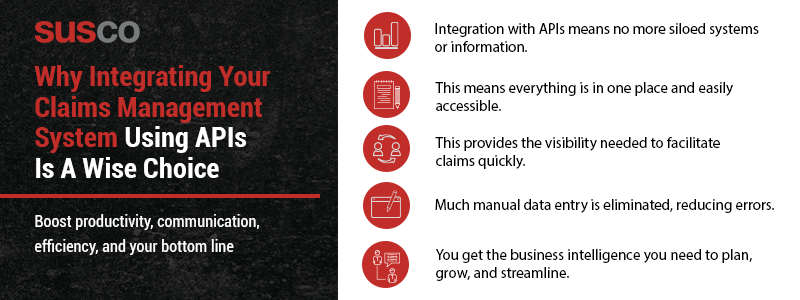Boost productivity, communication, efficiency, and your bottom line

Application Programming Interfaces (APIs) connect applications so they can exchange essential data to power data synchronization, improve productivity, and increase revenue. API integration combines tools and adds automation that updates connected applications in real-time as changes are made in certain specified data types.
API integrations are essential to prevent data siloes. Linking your claims management system (CMS) with other systems comes with benefits that include reduced errors, streamlined workflows, improved communication and collaboration, and the analytics and reporting essential for sound business decisions.
In addition, API integration gives you the flexibility to adapt to changing business needs and allows for rapid development. You’ll also provide better customer service, but that’s not all. Let’s dive deeper into why using APIs when integrating CMSs is necessary for the modern insurance services business.
Seamless data exchange
When you integrate disparate systems, they can exchange information without the need for duplicate data entry, reducing errors. The average error rate in manual data entry is around 1%, but it can be exacerbated if entries are made by someone in a hurry, tired, or entering something handwritten. While 1% may seem small, in the insurance business especially, errors can be pretty costly.
The easy and consistent data exchange provided by APIs improves your decision-making as well through:
- Real-time data insights that enable you to move at the speed of your business. No more waiting around for reports from different systems – everything is in one place, and there’s one single source of truth. In addition to making timelier decisions, you’ll be able to quickly spot any issues and solve them before they create problems.
- Individual data set reporting. The centralized hub created by integrating CMSs allows you to pull reports on specific data sets to give you the vital information you need to make sound decisions about a specific issue.
- Easily monitor your data stream. Automated alerts inform you when specified metrics go over thresholds so you can stay on top of changes that may affect overall company performance.
APIs are an indispensable part of today’s business intelligence tools – you can extract data from software to cloud storage to web pages and beyond. They pull data from your integrated system, push data into your system, and provide you with essential real-time data that offers improved accuracy and consistency in operations.
Improved communication and collaboration
We’re not just talking about people when discussing better communication and collaboration when integrating CMSs with APIs. It’s also about systems. Without integration, your various software platforms and applications can’t talk to each other. In this case, integration enables communication, and the data collaboration between systems gives you the information you need when you need it.
For people, integration means transparency throughout the claims process for everyone involved as well as easy access to information and documentation. There’s no more searching through different systems to get the complete picture. The integration provides visibility into everything at once.
Increased productivity and efficiency
Integrated information boosts productivity. No matter the platform or the system you use for access, up-to-date information will always be at your fingertips, tasks are completed more efficiently, and problems are solved more quickly.
APIs can also streamline your workflow because data is aggregated automatically instead of stored inside siloed systems that require manual work. Tasks such as transferring data from one system to another are eliminated, which not only reduces errors but saves on labor costs. Employees can spend their time on things that add more value to your business.
Integrating CMSs with APIs is the key to workplace efficiency, providing a powerful tool for business success. You can focus on what matters most – the growth of your organization.
Customization and flexibility
Every business is unique, which is why APIs can be customized for ultimate flexibility. With customization, the API developer can
- Consolidate several operations into one API.
- Use custom APIs as business events to create new integration capabilities, such as new trigger events.
- Create REST (representational state transfer) APIs and other solutions to build a library of services that can be used with intelligent bots and your mobile app.
When integrating CMSs, existing tools and frameworks that speed up the process can be used because APIs can leverage existing code.
When integrating disparate systems, API integration offers many advantages. These include:
- Integration reorganizes application and software interrelationships to be more efficient and match your organization’s needs.
- Automating tasks to save time, money, and effort.
- Simplifying the implementation of new applications and other digital products.
- Spurring innovative business models that perform faster, better, and at a reduced cost.
The value of APIs is easy to see, offering automation, efficiency, data exchange, and real-time reporting, as well as improving the bottom line.
Faster, better stronger with Susco
At Susco, we use APIs to make your business more efficient, boost your workflow, close operational gaps, and help you communicate effectively internally and externally. Get faster, better, stronger, and boost revenue.
For more than a decade, our dedicated team of web and application developers has built custom solutions that perfectly align with business goals. Discover what we can do for you. Get in touch today so we can schedule your free one-hour assessment.